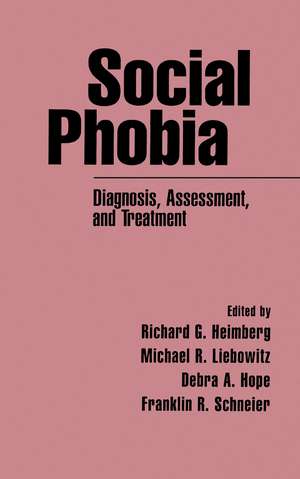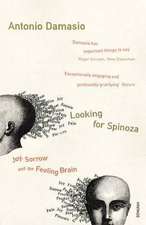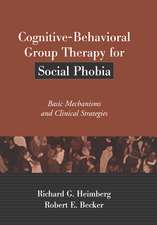Social Phobia: Diagnosis, Assessment, and Treatment
Editat de Richard G. Heimberg, Michael R. Liebowitz, Debra A. Hope, Franklin R. Schneieren Limba Engleză Hardback – 18 ian 1996
In this book, internationally renowned contributors fill a critical gap in the literature by providing an overview of current work in the diagnosis, assessment, and treatment of social phobia, the third most common psychiatric disorder.
Preț: 522.40 lei
Nou
Puncte Express: 784
Preț estimativ în valută:
99.96€ • 104.65$ • 82.71£
99.96€ • 104.65$ • 82.71£
Carte tipărită la comandă
Livrare economică 05-19 aprilie
Preluare comenzi: 021 569.72.76
Specificații
ISBN-13: 9781572300125
ISBN-10: 1572300124
Pagini: 435
Dimensiuni: 152 x 229 x 35 mm
Greutate: 0.79 kg
Ediția:New.
Editura: Guilford Publications
Colecția Guilford Press
ISBN-10: 1572300124
Pagini: 435
Dimensiuni: 152 x 229 x 35 mm
Greutate: 0.79 kg
Ediția:New.
Editura: Guilford Publications
Colecția Guilford Press
Public țintă
Postgraduate, Professional, Professional Practice & Development, and UndergraduateCuprins
Part I: History and Clinical Presentation
1. Diagnostic Issues, Heckelman and Schneier
2. Epidemiology and Family Studies, Chapman, Mannuzza, and Fyer
3. Descriptive Psychopathology, Rapee
Part II: Theoretical and Empirical Approaches
4. The Cognitive Model of Social Phobia, Clark and Wells
5. The Self-Presentation Model of Social Phobia, Leary and Kowalski
6. Neurobiology of Social Phobia, Nickell and Uhde
7. Conditioning and Ethological Models of Social Phobia, Mineka and Zinbarg
8. Developmental Factors in Childhood and Adolescent Shyness, Bruch and Cheek
Part III: Assessment
9. The Clinical Interview, Greist, Kobak, Jefferson, Katzelnick, and Chene
10. Behavioral Assessment: Self-Report, Physiology, and Overt Behavior, McNeil, Ries, and Turk
11. Cognitive Assessment, Elting and Hope
Part IV: Treatment
12. Cognitive Behavioral Treatments: Literature Review, Heimberg and Juster
13. Cognitive Behavioral Treatments: Clinical Applications, Butler and Wells 14. Pharmacological Treatments: Literature Review, Potts and Davidson
15. Pharmacological Treatments: Clinical Applications, Liebowitz and Marshall
Part V: Special Populations
16. Children and Adolescents: Assessment and Treatment, Albano, DiBartolo, Heimberg, and Barlow
1. Diagnostic Issues, Heckelman and Schneier
2. Epidemiology and Family Studies, Chapman, Mannuzza, and Fyer
3. Descriptive Psychopathology, Rapee
Part II: Theoretical and Empirical Approaches
4. The Cognitive Model of Social Phobia, Clark and Wells
5. The Self-Presentation Model of Social Phobia, Leary and Kowalski
6. Neurobiology of Social Phobia, Nickell and Uhde
7. Conditioning and Ethological Models of Social Phobia, Mineka and Zinbarg
8. Developmental Factors in Childhood and Adolescent Shyness, Bruch and Cheek
Part III: Assessment
9. The Clinical Interview, Greist, Kobak, Jefferson, Katzelnick, and Chene
10. Behavioral Assessment: Self-Report, Physiology, and Overt Behavior, McNeil, Ries, and Turk
11. Cognitive Assessment, Elting and Hope
Part IV: Treatment
12. Cognitive Behavioral Treatments: Literature Review, Heimberg and Juster
13. Cognitive Behavioral Treatments: Clinical Applications, Butler and Wells 14. Pharmacological Treatments: Literature Review, Potts and Davidson
15. Pharmacological Treatments: Clinical Applications, Liebowitz and Marshall
Part V: Special Populations
16. Children and Adolescents: Assessment and Treatment, Albano, DiBartolo, Heimberg, and Barlow
Notă biografică
Richard G. Heimberg, PhD, is Thaddeus L. Bolton Professor of Psychology and Director of the Adult Anxiety Clinic of Temple at Temple University. He is past president of the Association for Behavioral and Cognitive Therapies as well as former editor of the Association's journal Behavior Therapy. Dr. Heimberg is well known for his efforts to develop and evaluate cognitive-behavioral treatments for social anxiety and generalized anxiety disorder and has published several books and more than 300 articles and chapters on these and related topics.
Michael R. Liebowitz, M.D., is Professor of Clinical Psychiatry at the College of Physicians and Surgeons of Columbia University and Director of the Anxiety Disorders Clinic at the New York State Psychiatric Institute. A leader in studies of the diagnosis and treatment of anxiety disorders, he has played a key role in bringing attention to the problems experienced by persons with social phobia. Dr. Liebowitz also chaired the work groups that developed the DSM-IV diagnostic criteria for the anxiety disorders.
Debra A. Hope, Ph.D., is Associate Professor of Psychology at the University of Nebraska-Lincoln and Director of the Psychological Consultation Center. She has published widely on the assessment and treatment of social phobia, social skills, social anxiety in schizophrenia, and the process and efficacy of psychotherapy.
Franklin R. Schneier, M.D., is Associate Professor of Clinical Psychiatry at the College of Physicians and Surgeons of Columbia University and Assistant Director of the Anxiety Disorders Clinic at the New York State Psychiatric Institute. Diagnosis and treatment of social phobia has been a focus of his research.
Michael R. Liebowitz, M.D., is Professor of Clinical Psychiatry at the College of Physicians and Surgeons of Columbia University and Director of the Anxiety Disorders Clinic at the New York State Psychiatric Institute. A leader in studies of the diagnosis and treatment of anxiety disorders, he has played a key role in bringing attention to the problems experienced by persons with social phobia. Dr. Liebowitz also chaired the work groups that developed the DSM-IV diagnostic criteria for the anxiety disorders.
Debra A. Hope, Ph.D., is Associate Professor of Psychology at the University of Nebraska-Lincoln and Director of the Psychological Consultation Center. She has published widely on the assessment and treatment of social phobia, social skills, social anxiety in schizophrenia, and the process and efficacy of psychotherapy.
Franklin R. Schneier, M.D., is Associate Professor of Clinical Psychiatry at the College of Physicians and Surgeons of Columbia University and Assistant Director of the Anxiety Disorders Clinic at the New York State Psychiatric Institute. Diagnosis and treatment of social phobia has been a focus of his research.
Recenzii
The first volume to address the problems of social phobia from every conceivable facet--epidemiology, assessment, diagnosis, theory, research, and treatment....This volume offers hope for lifelong sufferers of social phobia and will be the standard definitive work for years to come. --Aaron T. Beck, University of Pennsylvania Medical Center
Social Phobia is an excellent, comprehensive introduction to this important subject and also provides an authoritative, up-to-date review of current knowledge and theories....It probably is the best text available on this topic at present. --Stanley Rachman, University of British Columbia
A landmark, encyclopedic, astonishingly current book....The editors are at the forefront of the recent crescendo of scientific advances in this hitherto neglected area. Scientists investigating social phobia will find this a remarkable resource....It is required reading for all mental health professionals and students. --Donald F. Klein, Columbia University College of Physicians and Surgeons and New York State Psychiatric Institute
-Social Phobia is an excellent, comprehensive introduction to this important subject and also provides an authoritative, up-to-date review of current knowledge and theories....It probably is the best text available on this topic at present. --Stanley Rachman, University of British Columbia
A landmark, encyclopedic, astonishingly current book....The editors are at the forefront of the recent crescendo of scientific advances in this hitherto neglected area. Scientists investigating social phobia will find this a remarkable resource....It is required reading for all mental health professionals and students. --Donald F. Klein, Columbia University College of Physicians and Surgeons and New York State Psychiatric Institute
Descriere
In this book, internationally renowned contributors fill a critical gap in the literature by providing an overview of current work in the diagnosis, assessment, and treatment of social phobia, the third most common psychiatric disorder.












